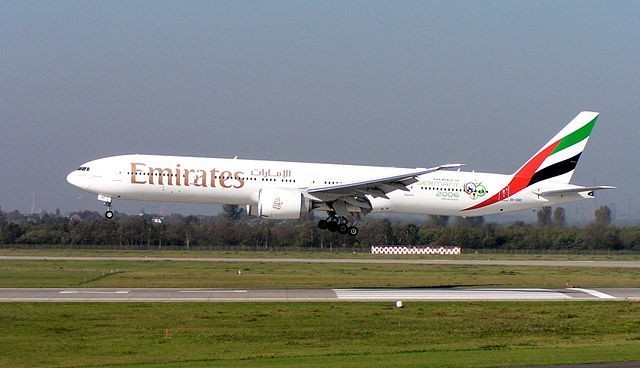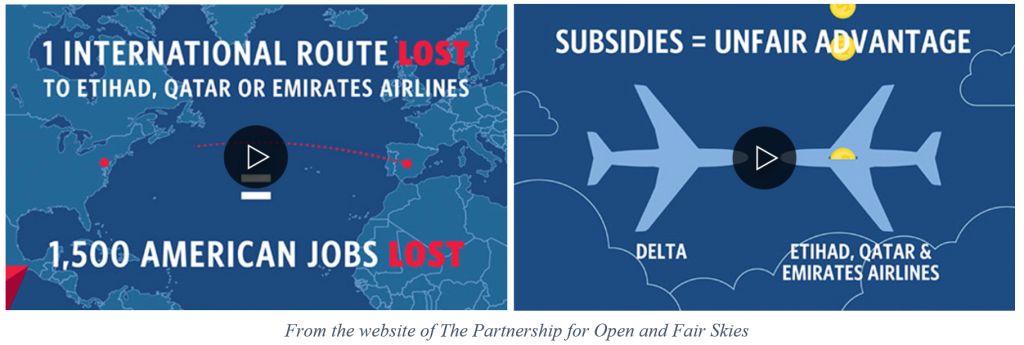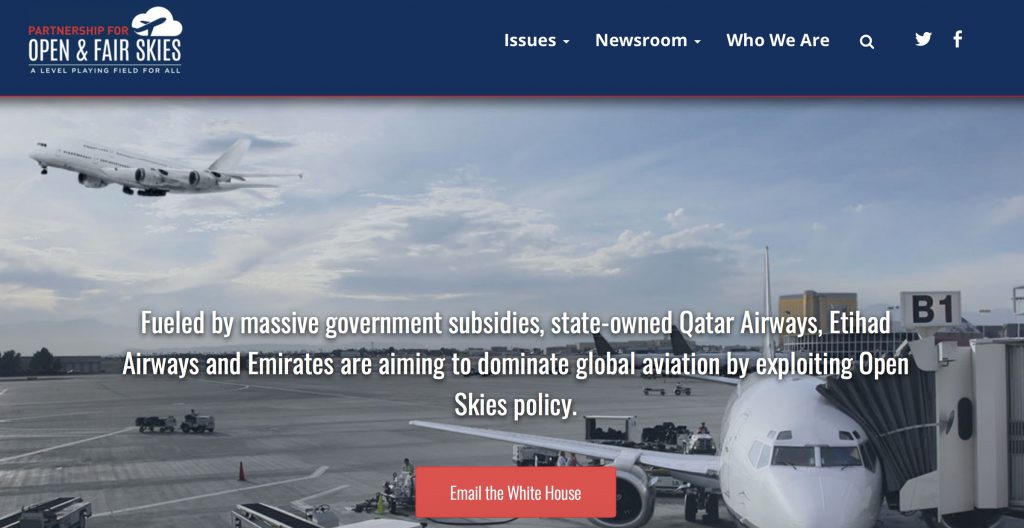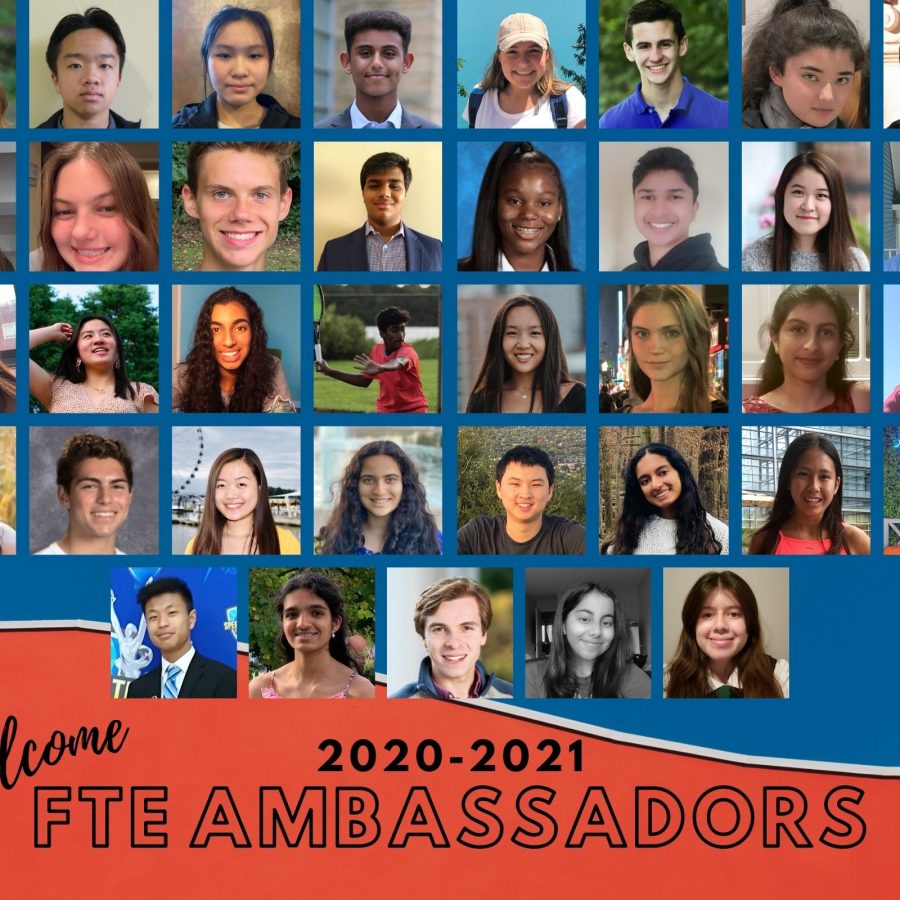Hot Topic: The US Airline Industry…Fight or Flight!?

- >
- Uncategorized
- >
- Hot Topic: The US Airlin…
By Greg Caskey, January 2018
Use this Hot Topic in the classroom! Teacher and Student Guides.
“It’s time to level the flying field. Spread the word to help enforce Open Skies trade agreements and protect the future of US aviation and American Jobs.” #OurFutureOurFight
Have you ever been in a situation in which you complained that a good or service has been offered too cheaply? Yes, too cheaply? Indeed, the question is difficult to understand. After all, one of the hallmark pillars of a market economy is business competition. That is, businesses should be able to freely compete with one another through a process of entrepreneurial discovery to see who can best serve the consumer with quality goods and services at a low price. While this complaint may not be something you’d hear from a consumer, it is certainly an accusation levied by competitors. In a word, welcome to the airline industry!
[expand title=”READ ON“]
During the last year, The Partnership for Open and Fair Skies launched a massive media campaign to combat the unfair business practices of the ME3, which refers to the three dominant Middle Eastern airlines, including Emirates, Etihad, and Qatar Airways. At the core of their complaint is the failure (or blatant disregard) of the ME3 to act in accordance with the Open Skies Agreements.
The basic goal of the Open Skies Agreements, agreed upon by over 100 nations (including Qatar and the United Arab Emirates, the governments that fund the ME3), has been to promote fair competition in an aviation market free from government interference. According to the US State Department, “Open Skies agreements have vastly expanded international passenger and cargo flights to and from the United States, promoting increased travel and trade, enhancing productivity, and spurring high-quality job opportunities and economic growth.” Having flown from the USA to South Africa and from the USA to South Korea, I have been a direct beneficiary of foreign carriers’ access to US markets, as have millions of other consumers. One of the more depressing experiences of my life was getting off a Korean Airways international flight (a mansion) and getting onto a US airways domestic flight (a trailer park), but that’s for another time.
What was the airline industry like prior to Open Skies? According to Foreign Affairs Magazine, “Before Open Skies, governments kept a tight grip on international air travel in an effort to give national carriers a financial advantage. The result was limited competition and high prices. In fact, studies show that prior to Open Skies, airfares for transporting passengers and cargo were between 9 and 32 percent higher than after Open Skies was implemented.” So, what’s the beef? What is the ME3 doing to anger the major carriers of United States airline industry?
Subsidies! To quote the website of The Partnership for Open and Fair Skies, “These three airlines, wholly owned by their governments, are using unprecedented subsidies to exploit their open and unfettered access to the U.S. market. This threatens our U.S. airline industry, airline jobs, and the U.S. economy.” Subsidies are payments from governments to businesses with the intended goal that their prices are able to remain lower and more attractive compared to their unsubsidized competition. The US airline industry (dominated by the big three carriers, including American, Delta, and United), which is not subsidized by the US government, sees the subsidies provided to the ME3 by the governments of Qatar and United Arab Emirates as directly in conflict with the Open Skies Agreements which call for an aviation market free of government interference. Jill Zuckman, Chief Spokesperson for The Partnership wrote, “A perfect example is Emirates’ most recent route between Athens, Greece, and Newark, NJ, a money-losing flight that is only possible because of government subsidies. That Emirates would refer to itself as ‘profit oriented’ is simply laughable.”
So, what is the extent of the subsidies being granted to the ME3 by governments of Qatar and United Arab Emirates and their effect on the US airline industry? According to the “Just the Facts” section of The Partnership for Open and Fair Skies website:
- The Gulf carriers have received over $50 billion in subsidies over the past decade from their countries’ governments.
- Because they have large sums of money available from their governments, these three airlines don’t have to rely on profit.
- These subsidies are a clear violation of Open Skies policy, which is based on the principle of fair competition in a marketplace free of government distortion.
- Because the gulf carriers have the unfair advantage of their government providing them billions of dollars in subsidies, the major U.S. carriers are at risk of going out of business.
- There are 1.2 million American workers who rely on a strong U.S. aviation industry.
- For every international route that U.S. airlines lose, 1500 Americans lose their jobs.
- Gulf carriers have openly stated they’re coming for U.S. routes as they run out of markets to target.

An important question arises, namely who exactly comprises this The Partnership for Open and Fair Skies? Perhaps unsurprisingly, The Partnership is “a coalition composed of American Airlines, Delta Air Lines and United Airlines, along with the Air Line Pilots Association Int’l, the Allied Pilots Association, the Airline Division of the International Brotherhood of Teamsters, the Association of Flight Attendants-CWA, the Association of Professional Flight Attendants, the Communications Workers of America and the Southwest Airlines Pilots’ Association.” For obvious reasons, these groups have a very strong interest in the US airline industry remaining competitive.
As mentioned above, The Partnership for Open and Fair Skies is an organization of individuals representing tens of thousands of workers in the US airline industry. They have expended considerable resources to put together a website, video campaign, and lobbying effort to combat the actions of the ME3. With this in mind, we can assume that the management of the major US airlines and labor associations represented in The Partnership for Open and Fair Skies believe that their usage of scarce resources to put together this campaign was a better usage of resources than the opportunity cost, which is the value of the next foregone alternative whenever a choice is made. The incentive to expend significant resources to lobby and advocate in this way is the huge potential reward of higher profits that would come with enhanced position in the international flight market against that of the ME3. Indeed, The Partnership also behaves perfectly in accordance with the economic idea of “Concentrated Benefits and Diffuse Costs”. This refers to a situation in which a smaller, highly organized group of people receives significant benefits from some government action (in this case, the US airline industry) at the expense of a large, unorganized group (millions of US consumers) who in this case suffer slightly higher flight prices as a result of the government protection. In this case, the small but concentrated group has significant incentive to see that the Open Skies Agreements are enforced, while the individuals in the larger group lack a strong incentive and the organizational ability to lobby on behalf of their collective interests as consumers. Let’s put this to the test… does any fellow consumer of international flights want to go meet me in Washington D.C. to lobby in front of the U.S. Capitol to continue to allow the ME3 to offer subsidized flights? I wouldn’t count on it.
We also need to take a look at the role of institutions at work here. Institutions are “the rules of the game”; the laws, customs, moral principles and cultural values that influence people’s choices. Consider this screenshot of The Partnership’s website; It is not merely an informational website, rather it includes a call to action, namely “Email the White House”. The individuals comprising The Partnership believe that if they can win enough sympathy on the part of US consumers through their campaign to the extent that they would take time of out their busy day to write concerned emails to the White House, that the institution of the US government would step in to punish the ME3 for unfair business practices. By their action, we can assume that there is a precedent for the US government stepping in to promote the interests of US businesses. There are also cultural and moral institutions in place that government officials be held responsible for enforcing the law of the land, including international arrangements like the Open Skies Agreements.
Let’s take a deeper look at the choices made by the government officials of Qatar and the United Arab Emirates, as well as ME3 officials. Even though both countries are on board with the Open Skies Agreements (although according to the state department, Qatar’s agreement status is listed as “Provisional”), both countries continue to provide massive subsidies to their airlines because they believe the benefits outweigh the costs, and that they likely believe that the US government will not intervene to stop their behavior. Of course, these subsidies come at tremendous cost to the taxpayers of Qatar and the United Arab Emirates, while significant benefits flow to the citizens of other countries like the United States who are able to enjoy the low prices of subsidized ME3 international flights. If these governments have been continuously violating the Open Skies Agreements for years and enraging the powerful US airline industry more and more by the day, why has the US government not intervened?
It turns out we are leaving out a key component of this whole affair, namely the Boeing Company, one of the largest businesses in the United States and a giant in the aviation industry for many decades. Take a wild guess: Who do you think is one of Boeing’s largest customers, particularly for their most expensive aircraft that engage in the longest international routes and carry the most passengers? You guessed it again! It’s the ME3. According to Business Insider’s Benjamin Zhang,
“Take Emirates, for instance: The airline is one of Boeing’s most important and reliable customers. Emirates’ fleet of 160 Boeing 777s is the largest of its kind in the world and worth $45 billion. To put things into perspective, if a 737 is the aeronautical equivalent of a $25,000 family sedan, then a 777 is a $100,000 Cadillac Escalade. And Emirates has been buying these “Cadillacs” in bulk, with orders for another $86 billion worth of Boeing 777 and next generation 777X airliners. It’s not just Emirates. Collectively, the ME3 account for nearly 80% of the 306 777X aircraft Boeing has sold.”
On one hand, the US government could step in to enforce to Open Skies Agreements to force the ME3 to compete fairly by ending or curtailing their usage of massive subsidies. This could potentially be done by implementing a partial ban of ME3 flights from certain US airports. But not so fast. If you do that, you’ll anger the governments of the United Arab Emirates and Qatar, who financially back the ME3, who are the largest customers of Boeing, which is one of the largest companies in the United States. Indeed, the Boeing Company has significant incentives to make sure that the governments of Qatar and the United Arab Emirates are able to conduct business as they please with the consumers of the United States, as hundreds of billions of dollars of sales to the ME3 are at stake. As Ron Burgundy would say, “Well, that escalated quickly!”
Through the enforcement of the Open Skies Agreements, the benefits accrued to certain groups are clearly visible to the observer, as we can look to see thousands of jobs maintained across the US airline industry at American, Delta, and United. Pilots, flight attendants, mechanics, marketing directors, and scores of other jobs at these major firms are protected. But one must ask, what are the unseen costs of enforcing the Open Skies Agreements? How much money would US consumers save if given unfettered access to the cheap international flights of their choice offered by the ME3? Additionally, with more money in pocket, how would US consumers have expended these additional resources? What businesses lost out on additional profits as a result of US consumers paying higher prices for international flights? Furthermore, what jobs were never created as a result of these lost profits?
While we can never know the answers to these questions, these losses cannot be ignored or overlooked in this discussion. What is clear is that it misleading to postulate that American jobs are saved through the enforcement of the Open Skies Agreements. A more accurate assessment of the situation would include not merely a discussion of visible benefits of such enforcement, but also an overview of the substantial unseen costs being borne by US consumers and businesses. In his classic work Economics in One Lesson, Henry Hazlitt wrote, “The bad economist sees only what immediately strikes the eye; the good economist also looks beyond. The bad economist sees only the direct consequences of a proposed course; the good economist looks also at the longer and indirect consequences. The bad economist sees only what the effect of a given policy has been or will be on one particular group; the good economist inquires also what the effect of the policy will be on all groups.” It is not difficult to see the application of this famed quotation to our present discussion.
Sources:
- http://www.openandfairskies.com
- http://www.businessinsider.com/trump-wont-weigh-in-on-open-skies-fight-with-emirates-eithad-qatar-2017-3
- http://www.businessinsider.com/american-delta-united-feud-emirates-etihad-qatar-trump-policy-2017-4
- http://www.businessinsider.com/emirates-cuts-flights-america-trump-travel-ban-2017-4
- http://www.businessinsider.com/deltas-rivals-strike-back-after-video-attacking-middle-eastern-airlines-2017-7
- http://www.businessinsider.com/american-delta-united-feud-emirates-etihad-qatar-trump-policy-2017-4
- http://www.businessinsider.com/emirates-cuts-flights-america-trump-travel-ban-2017-4
- https://www.bloomberg.com/news/articles/2017-08-01/u-s-defenders-of-gulf-airlines-are-said-to-press-tillerson
- https://www.foreignaffairs.com/articles/qatar/2017-09-07/trump-trade-and-open-skies
[/expand]

Welcome: 2020-21 FTE Student Ambassadors
This year, FTE is welcoming thirty-seven student ambassadors who are committed to sharing the economic way of thinking. FTE Ambassadors…

Webinar: The Economic Implications of COVID-19: An Update
On Wednesday, June 10 at 6:00 PM ET/ 3:00 PM PT, Professor Scott Baier, Chair of the Economics Department at…

Webinar: This Is Your Brain On Numbers: Data, Statistics and COVID-19
On Wednesday, May 27 at 3:00 PM PT/ 6:00 PM ET, FTE will present a webinar titled This Is Your…
